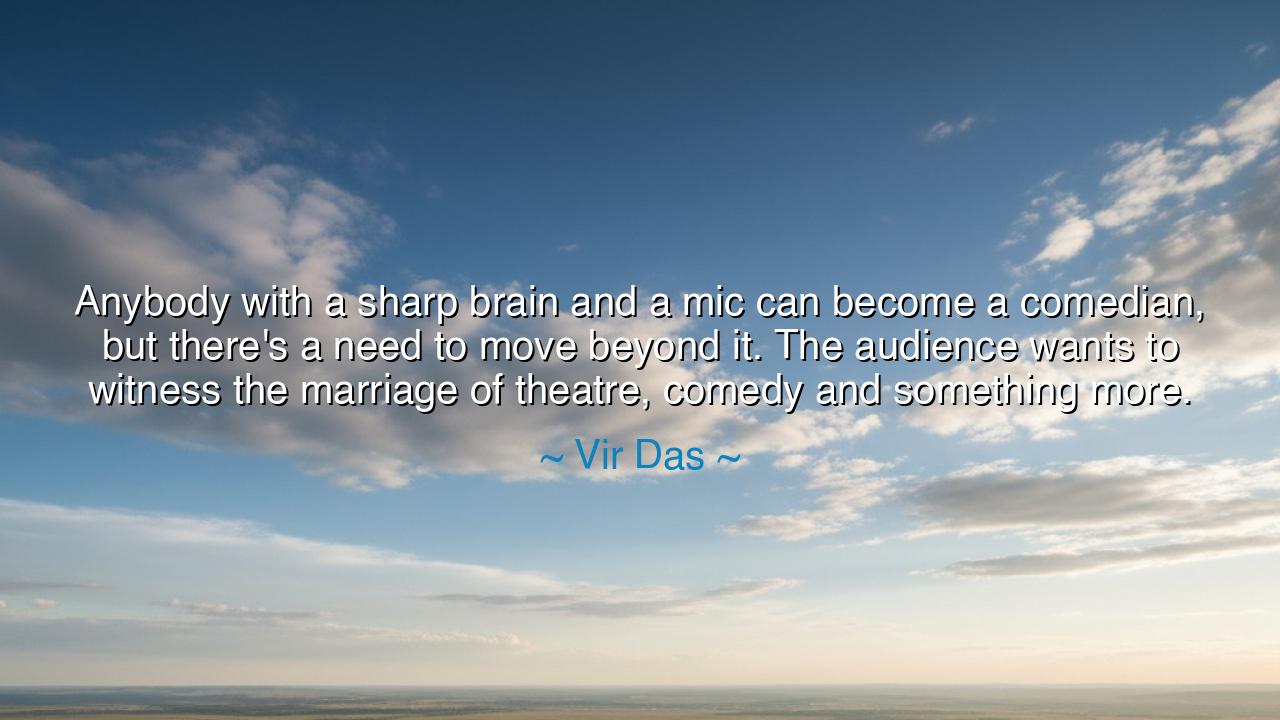
Anybody with a sharp brain and a mic can become a comedian, but
Anybody with a sharp brain and a mic can become a comedian, but there's a need to move beyond it. The audience wants to witness the marriage of theatre, comedy and something more.






Anybody with a sharp brain and a mic can become a comedian—these words spoken by the wise Vir Das resonate deeply in an age where talent is often measured by the surface-level ability to entertain. A sharp wit and the ability to make others laugh are indeed precious gifts, but comedy—true comedy—demands more than mere cleverness. It calls for a depth that transcends the immediate. The ability to provoke thought, to challenge norms, to make people question their own understanding of the world—these are the marks of a true comedian. For comedy is not merely a device for momentary amusement; it is a vehicle for transformation, a reflection of the human condition, and a means by which society can be both entertained and enlightened.
Yet, Vir Das reminds us that the world of comedy is vast, and its potential is even greater. To say that the audience wants to witness the marriage of theatre, comedy, and something more is to recognize that comedy has always had a dual purpose: to entertain and to elevate. Comedy, when wielded with purpose and skill, is not just an art of laughter, but an art of reflection—a means to hold up a mirror to society and reveal its hidden truths. From the days of the ancient Greek theatres, where Aristophanes used sharp wit to critique politics and society, to the brilliant satirists of the Renaissance, comedy has always served a higher function. It has been both theatre and philosophy, a means to reach the hearts and minds of the people and challenge them to see the world differently.
In times of great change or oppression, comedians have often been the voices of the people, calling attention to the injustices, the absurdities, and the contradictions that surround them. Charlie Chaplin, whose genius graced the early days of cinema, understood this well. His silent films, though full of slapstick humor, also contained profound social commentary. In the face of industrialization, poverty, and war, Chaplin used his comedic genius to speak truth to power, to highlight the human condition with humor, yet never at the expense of its deep, sometimes tragic reality. His work was a perfect example of what Vir Das alludes to—the combination of comedy, theatre, and something greater: a force that could entertain and yet provoke thought and change.
There is a depth to comedy that goes beyond the surface, and Vir Das understands this. Comedy is not simply a vehicle for jokes or trivial observations. It has the potential to be an agent of change. In the modern world, stand-up comedy has evolved to include not only laughter but commentary on social issues, politics, and the human condition. Comedians like Dave Chappelle and John Oliver have become cultural critics, weaving their performances with sharp insights into race, class, and politics. They understand that the power of comedy lies not just in making people laugh, but in forcing them to confront uncomfortable truths—truths that might be too difficult to hear if spoken directly. In this way, comedy becomes an important tool in the fight for social justice and change.
Vir Das, in calling for something more than just sharp wit and a microphone, is urging us to see comedy as a catalyst for growth. He challenges the comedian to move beyond simply being an entertainer, to become a storyteller, a critic, and a teacher. Theatre, in its most powerful form, is not just an act of performance but an act of courage, a willingness to speak truth to power, to bring the stories of the marginalized into the light, and to challenge the status quo. Comedy, then, becomes the tool through which this transformation can take place. It is the vessel in which profound ideas are carried, disguised in the playful, welcoming guise of laughter.
The lesson to be learned from Vir Das’s wisdom is this: when we embrace comedy as more than mere amusement, we unlock its true potential. We must seek to combine theatre and comedy, as well as the deeper truths they are meant to convey. Just as the ancient Greek tragedians used the stage to explore the deepest aspects of human nature, so too must today’s comedians use their craft to question, to provoke, and to inspire. It is not enough to simply entertain; the true power of comedy lies in its ability to spark reflection, dialogue, and change.
So, future generations, take up this mantle. When you speak, when you create, when you perform, remember that comedy is more than the art of laughter—it is the art of truth. Use it to challenge, to question, and to build a world that is not only more joyful, but more just. Whether through the stage, the screen, or the everyday moments of life, let your laughter be a call to action, a reminder that change is always possible when we combine comedy, theatre, and something greater. Love, justice, and humanity should always be at the heart of every performance, for in these lies the true transformative power of the comedic arts.






AAdministratorAdministrator
Welcome, honored guests. Please leave a comment, we will respond soon